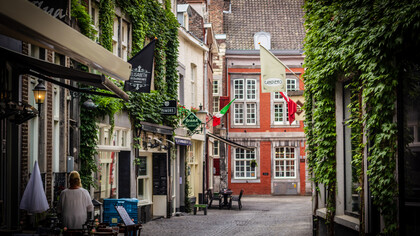My story begins in 1944—decades before I was born—when Bulgaria, searching for salvation after the collapse of empires, turned to communism. What started as a dream of fairness and dignity was quickly crushed by totalitarianism. Oppression didn’t only come from above—it settled into classrooms, workplaces, and homes. When the Berlin Wall fell, so did Bulgaria’s regime. But freedom didn’t follow. A power vacuum opened the door to lawlessness, corruption, and a carousel of mafia governments. The promised democracy never came.
You might wonder why that’s relevant—I wasn’t even born until 2000.
But as each regime’s promise of salvation came and went, two things remained: the heartlessness idealized during mafia times and the obedience glorified under communism. I was born to a family shaped by this, in a country defined by this. I felt that conflict in my heart—the constant tension between ambition and morality, always treated as opposites.
So how do you choose? To be a good person or to have a good life? Unfortunately, the society I grew up in chose neither. It chose distrust. People obeyed the system or tricked it—but never considered themselves part of it.
That never sat right with me.
Like many young people who became EU citizens early on, I saw how close another world was. I always wanted to be a journalist. From a young age, I dreamed of exposing corruption and understanding how we could change things.
By complete chance, I found myself at a university fair abroad. I saw a course called European Studies. Seeing how diverse Europe is—and how the EU had uplifted Bulgaria—I felt this course could give me the insight to write investigative pieces that don’t just reveal but explain. In 2020, I returned home during the pandemic and landed an internship at a TV station. I was excited to see the news machine from the inside. But what I met was the same disappointment my country had felt for generations. Corruption had eroded journalistic integrity to its core. Every face in that office hid its own quiet surrender—to lawlessness or obedience.
I went back to the Netherlands confused about my purpose. Post-COVID, I was close to graduation, but my dreams felt crushed. I was absorbing the same distrust I grew up with—amplified by the global failures in handling the pandemic. For many in my generation, this was our first life-altering event. It took our lives just as we were beginning them. It made us question everything we believed was set in stone. It exposed the fragility of our systems. We saw how much suffering can come from slow, shallow governance—but also how much can change in a day if the people in power want it to.
Then, once again by chance, I discovered something called policy analysis. It matched my love for journalism—but with data as its foundation. Not just stories and spin, but actual structures. I saw how small differences between countries could lead to radically different outcomes for entire populations.
Through my studies, I became deeply interested in migration. I realized the issue was broader than the refugee stories we’re often fed. It included my own journey to the Netherlands—driven by a search for knowledge and a better future. It reflected the cultures I’d experienced growing up in a country at the entrance of Europe—shaped by the Middle East, Russia, Western Europe, and our Balkan roots. And it highlighted the duty that wealthier countries carry toward less developed ones.
That captivated me.
I realized these were topics I had always gravitated toward—researching them, writing about them, and trying to understand them. Since then, I’ve written my master’s thesis on how migration influences perceptions of corruption in Bulgaria. I have conducted migration policy analysis for local municipalities. I have also worked with refugees in the field across five countries, combining research and advocacy—from media work and campaign writing to policy evaluation and on-the-ground interviews.
I’ve always been drawn to people’s stories—and I think people feel that. I’m a natural interviewer, and most importantly, I have the ability to listen and to understand. And now, I’m passionate about combining personal stories with data to raise the right questions and bring complex information to the public. I want to uncover the truths that often stay hidden—buried behind propaganda spins, incomprehensible statistics, and language reserved for intellectuals.
In doing this work, I finally reconciled the ambition and morality in me. I rejected the shadows of lawlessness and obedience. I now stand for ideas I believe in—and lift others with me. And that was only possible once I saw a society united by shared values and the belief that people should have a say. In a word: democracy. But not just the idea of it—a functioning one.


